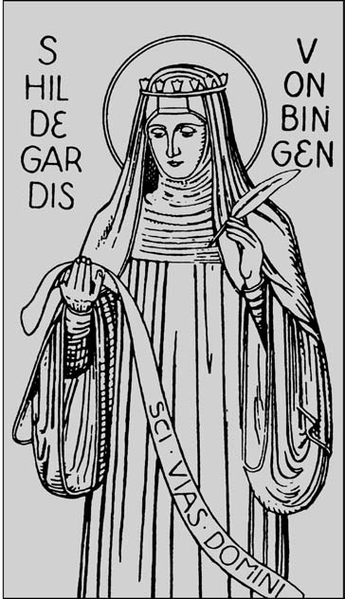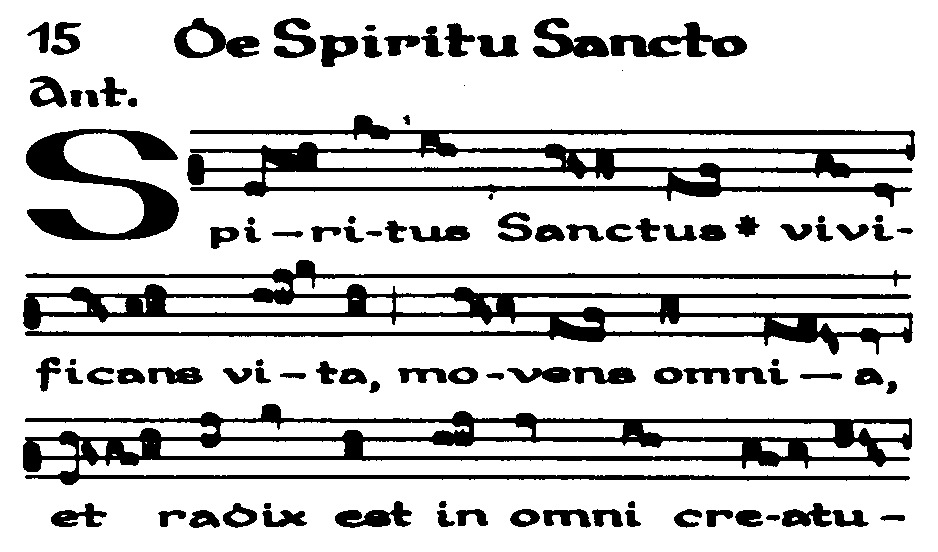Abbess, Scientist, Lyricist and Composer: Hildegard of Bingen
The musical endeavors of a remarkable 12th-c. nun | post by Nathan Hillanbrand

[Print from unknown 18thcentury artist, Wikimedia.] Hildegard’s inspiring music was part of a lifelong mission; echoing David’s prayer in Psalm 25:4, the Latin on the scroll pictured above reads “Know the Ways of the Lord.” This motto, shortened to Scivias, was the title of her first theology book.
The sounds of monastic chant fill the dimly-lit room, illuminated by a single window. A young man bends over a centuries-old text, deep in thought. He strains all his wits, attempting to render the difficult Latin into his own tongue. Pausing to gather his strength before plunging into another bewildering line of Virgilian hexameter, the inexperienced scholar begins to despair. At that moment the monks begin a new song; Credo in Unum Deum, Patrem Omnipotentem...the meaning of these words is very familiar. “I believe in One God, the Father Almighty;” it is the beginning of the Nicene Creed he says in English at every service. Who is this solitary figure? It is me, an exhausted college student, trying to inspire myself to complete the last semester of my classical language requirement.
As a small child, barely able to see over the pew from my kneeler, the Lenten shift from Anglican psalm chant to Gregorian plainsong moved my heart in a way I couldn’t fully understand. My love for chant grew over the ensuing years of formal musical study and worship participation, with settings spanning all the way from Ambrose to Poulenc and Rutter. St. Hildegard of Bingen, however, did not come onto my radar until last fall in a music history course. I was intrigued by this rare female medieval composer, whose untrained talent produced incredibly unique variations on the chant tradition.
So, it caught me totally by surprise to see Hildegard featured as a physician and naturalist in CH’s Science and Technology issue! I read with intense interest as Glenn Myers described Hildegard’s extensive scientific and medical contributions. I was astounded to learn that she studied such a diversity of fields in addition to her theological and devotional writings: zoology, phlebotomy, nutrition, mental health…the list just kept going! Amidst this impressive research résumé, the mention of Hildegard’s music—especially the revelation that it is “still played today”—made me eager to look into it further.
To my great delight, I found out that not only have Hildegard’s beautiful chants inspired many instrumental adaptations, but the convent named in her honor has recorded a CD of the originals. As we are now in the season of Pentecost, it seems appropriate to highlight this recording, one of Hildegard’s hymns to the Holy Spirit (excerpt from 1997 album,“O Vis Aeternitatis” Vesper). The beginning of its score is shown below.

[Image from Wikimedia.] Beginning of one of Hildegard’s antiphons (short pieces inserted into another chant as a refrain). In the recording provided above, it precedes and follows the traditional Gregorian chants of Psalms 110 and 111.
With a little musical translation, the shape of the singing can be easily identified in the neumes—early notes—shown above; the stacked dots were read bottom-to-top (not as chords), and a curlicued porrectus indicated a high-low-middle sequence. (The familiar musical staff only had four staves at this time, rather than the five used today.)
The buoyant lines of this antiphon pleasantly offset the plainer beauty of the psalmody it book-ends. Hildegard’s lyrics were equally vibrant, as medievalist Nathaniel M. Campbell captures in this English rendering:
The Holy Spirit: living and life-giving,
all things moving,
the root of all created being:
of filth and muck it washes
all things clean—
no guilty stains remaining,
its balm our wounds constraining—
and so its life with praise is shining,
rousing and reviving
all.
The words themselves are striking, but Hildegard’s characteristic synergy of text and song is especially evident in the original Latin. The Holy Spirit, Spiritus Sanctus, enters like a swirling, rushing wind; gentle, yet potent. The spiritual “wounds,”vulnera, of the worshippers are sung of with a plaintive cry. The Spirit’s “shining,” fulgens, practically shimmers. Its “reviving” action, resuscitans, dramatically springs up on the second syllable, like the Divine breath entering the dry bones of Ezekiel’s vision.
As evidenced by this sample, Hildegard’s highly original work artfully exceeded the bounds of contemporary expectation. Her main purpose, however, was not musical invention; she believed that music can speak directly to the conscience, for the “human intellect has great power to resound in living voices, and arouse sluggish souls to vigilance by the song.” Like her scientific and theological works, Hildegard’s music situates humanity in a Divine order and plan, against which all earthly sorrows—including her own battles with chronic illness—fade into one glorious and harmonious symphony of praise.
But perhaps the most inspiring part of Hildegard’s story is her incredible example of humility. In a letter to an uncertain young lady who sought her advice, she explains her total reliance on God with a favorite musical metaphor:
“Who desire to accomplish the works of God, let them always consider that they are earthen vessels…only reciting the mysteries of God, just as a trumpet only makes sounds, but does not cause them…But I too lie in the pusillanimity of my mind, fatigued much by fear, sounding a little, at times, like the small sound of a trumpet from the living light.”
The kindly abbess closes with this simple prayer above her signature: “Whence God help me, that I may remain in his ministry.” Humbled by her saintly humility amidst such vast accomplishments, I affix this prayer to the wall of my room, and add the spiritually enriching works of Hildegard to my playlist.
Nathan Hillanbrand is a CH summer intern, and is studying history and journalism at Patrick Henry College.
The International Society of Hildegard von Bingen Studies is a phenomenal resource for learning more about her multifaceted life and writings.



